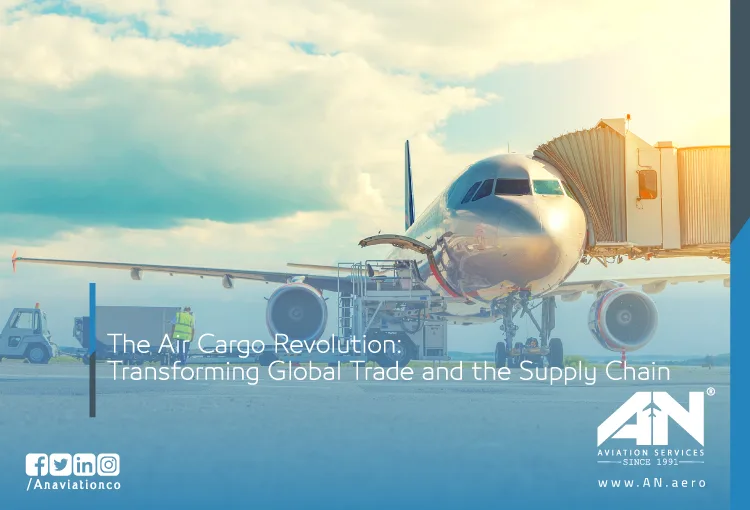
The air cargo industry has become the backbone of global trade and supply chain logistics. From enabling e-commerce giants to deliver goods within days to transporting life-saving medical supplies across continents, air cargo plays an essential role in connecting businesses and consumers worldwide. However, the sector is currently experiencing a revolution, driven by advancements in technology, increased demand, and the evolving needs of global trade. This blog explores the air cargo revolution, its implications on the supply chain, and what the future holds for this vital industry.
The Evolution of Air Cargo
The air cargo industry has come a long way from its modest beginnings. Historically, air freight was primarily used for high-value goods or urgent shipments. Today, the scope of air cargo has expanded exponentially, serving industries as diverse as fashion, pharmaceuticals, and electronics. This transformation can be attributed to the growing demand for speed, reliability, and efficiency in global trade.
The rise of e-commerce platforms such as Amazon and Alibaba has further accelerated this shift. Customers now expect faster delivery times, forcing companies to integrate air cargo into their supply chains. According to recent data, the air cargo industry has grown by over 20% in the past decade, marking a clear departure from its traditional role to becoming a pivotal player in the global trade ecosystem.
Key Drivers of the Cargo Revolution
1- Technological Advancements:
Innovations in cargo aircraft technology, tracking systems, and automation tools have revolutionized air cargo operations. For instance, real-time tracking allows businesses to monitor shipments from origin to destination, improving transparency and customer satisfaction. Additionally, advanced aircraft are now designed to optimize fuel efficiency while carrying larger loads, making air cargo more sustainable.
2- Global Trade and E-Commerce:
The integration of air cargo into e-commerce operations is perhaps the most significant driver of the revolution. The need to meet consumer expectations for same-day or next-day deliveries has made air freight indispensable for online retailers.
3- Pandemic-Driven Changes:
The COVID-19 pandemic highlighted the critical role of air cargo in transporting essential goods such as vaccines, medical equipment, and protective gear. This period underscored the need for a reliable and flexible cargo system, pushing the industry toward adopting innovative practices.
4- Global Connectivity:
Air cargo connects remote regions with global markets. This increased connectivity supports small businesses, enabling them to reach customers worldwide. In turn, this strengthens economies by creating opportunities for trade and commerce on a global scale.
Impact on the Supply Chain
The air cargo revolution is reshaping how businesses manage their supply chains. Here’s how:
- Speed and Efficiency: Air cargo provides unparalleled speed compared to other modes of transport, ensuring that goods reach their final destination quickly and efficiently. This is particularly critical for industries dealing with perishable or time-sensitive goods, such as pharmaceuticals and fresh produce.
- Reduced Dependency on Warehousing: Faster transportation times reduce the need for large storage facilities. Businesses can adopt a leaner supply chain model, focusing on just-in-time inventory to cut costs and improve efficiency.
- Enabling Global Trade: By providing reliable and rapid transport options, air cargo eliminates geographical barriers, allowing companies to access international markets seamlessly. This connectivity fosters economic growth and innovation.
Challenges in the Air Cargo Industry
While the air cargo industry is advancing rapidly, it is not without its challenges. Rising fuel costs, stringent regulatory requirements, and environmental concerns pose significant obstacles. Additionally, the industry must address issues related to capacity constraints, as the demand for air cargo services continues to grow.
Sustainability in the Air Cargo Sector
Sustainability is a major focus for the future of air cargo. The industry is working to minimize its environmental footprint by adopting sustainable aviation fuels (SAF), lightweight materials, and energy-efficient aircraft. These innovations aim to reduce greenhouse gas emissions by up to 80%, aligning the industry with global sustainability goals.
Furthermore, many air cargo operators are exploring the use of renewable energy and eco-friendly practices to enhance the sustainability of their operations. From electric ground handling equipment to optimized routing systems, these efforts are paving the way for a greener future.
The Future of Air Cargo
The future of air cargo is poised for significant growth, driven by technological advancements and the increasing demand for rapid delivery services. Key trends to watch include:
- Automation: From AI-powered cargo management systems to autonomous aircraft, automation will play a crucial role in enhancing efficiency and reducing operational costs.
- Digital Transformation: The integration of digital tools, such as blockchain for secure tracking and big data analytics for demand forecasting, will revolutionize how air cargo operations are managed.
- Increased Capacity: With new aircraft designs and optimized logistics, the industry will be better equipped to handle the growing demand for cargo services.
- Sustainability Focus: Continued efforts to adopt greener technologies and practices will ensure the air cargo industry remains environmentally responsible while meeting global demand.
Conclusion
The air cargo revolution is transforming global trade and supply chains in ways never imagined before. By embracing technological advancements, sustainable practices, and innovative solutions, the air cargo industry is not just meeting the needs of today but also paving the way for a brighter, more connected future. Whether it’s delivering medical supplies in emergencies or enabling businesses to reach international markets, air cargo continues to play a vital role in the global economy.
As we look ahead, the challenges faced by the industry must be addressed collaboratively to ensure that the revolution in air cargo leads to lasting benefits for businesses, consumers, and the planet.

